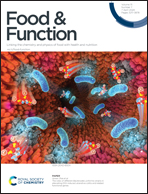Mannan-oligosaccharides promote gut microecological recovery after antibiotic disturbance†
Abstract
Antibiotic treatment often causes collateral damage to the gut microbiota, including changes in its diversity and composition. Dietary fiber helps maintain intestinal health, regulate short-chain fatty acids, and promote the recovery of the intestinal microbiome. However, it is currently unknown which specific plant-based dietary fiber is optimal as a dietary supplement for restoring the intestinal microbiota after antibiotic disturbance. Previously, we proposed predictive recovery-associated bacterial species (p-RABs) and identified the most important interventions. This study aimed to identify an optimal form of dietary fiber to recover the gut microbiome after antibiotic treatment. Therefore, we examined the types of dietary fibers associated with p-RABs through a p-RAB–metabolite bilayer network constructed from prior knowledge; we searched for dietary fiber that could provide nutritional support for Akkermansia muciniphila and Bacteroides uniformis. C57BL/6J mice were fed with 500 mg kg−1 of different types of dietary fibers daily for one week after being treated with ampicillin. The results showed that mannan-oligosaccharides could better promote the diversity of intestinal microbial growth, enhance the recovery of most genera, including Akkermansia and Bacteroides, and inhibit certain pathogenic bacteria, such as Proteus, compared to the other fiber types. Furthermore, mannan-oligosaccharides could regulate the levels of short-chain fatty acids, especially butyric acid. Functional predictions showed that starch metabolism, galactose metabolism, and the metabolism of other carbohydrates played key roles in the early recovery process. In conclusion, mannan-oligosaccharides could enhance the recovery of the intestinal microbiome after antibiotic treatment, offering valuable insights for targeted dietary strategies.



 Please wait while we load your content...
Please wait while we load your content...